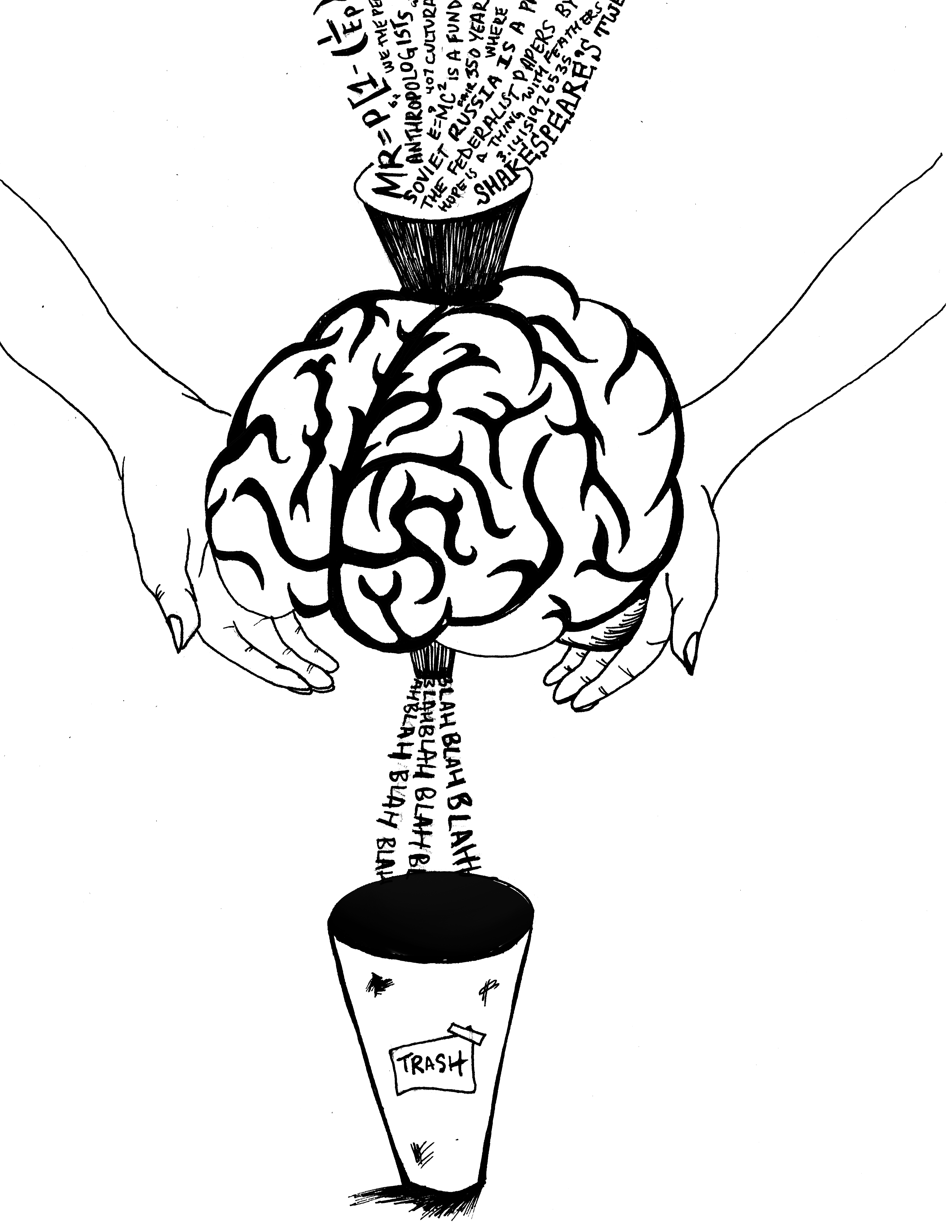
It’s almost finals season — a time when students like me begin to wonder whether or not binge-watching three seasons of Scrubs on Netflix was the best use of Thanksgiving break. More importantly, we ask ourselves a simple question: Have we learned anything this semester? For a good portion of us, the answer is no — at least if research is to be believed.
 In 2011, researchers Richard Arum and Josipa Roksa found that 45 percent of college sophomores had exhibited no measurable improvement in critical thinking or writing skills since high school. So college isn’t doing a great job of making us smarter. What gives?
In 2011, researchers Richard Arum and Josipa Roksa found that 45 percent of college sophomores had exhibited no measurable improvement in critical thinking or writing skills since high school. So college isn’t doing a great job of making us smarter. What gives?
Not much has changed in college classrooms for hundreds of years; the way we teach today is largely the same as it was in the mid-18th century. Why are purported bastions of academic thought intentionally ignoring the fruits of decades of education research?
Take lectures, for example — a staple of university pedagogy. An overwhelming body of literature suggests that lectures do almost nothing to inspire interest in a topic or promote thought. In fact, lectures foster an unhealthy social pressure to be academically disengaged; nobody likes the guy asking questions in a crowded auditorium. At best, lectures are decent tools to relay information. But even then, students are better off watching a video recording, which they can rewind and replay, rather than sitting in a classroom each morning. Indeed, when given the option to do so, students overwhelmingly avoid the lecture hall; just ask any student in CS50, whose lectures are all streamed on YouTube.
Of course, academia is not completely oblivious to the shortcomings of the lecture format. Sections were developed to facilitate discussions that are impossible in a room of 200 people. Yet the section system, too, is broken, at least at Yale. For courses that do not mandate section attendance, few if any students show up. For courses that do, the silence is deafening, save for the students we (not so) affectionately dub “section assholes.” Seminars are far more effective, but there simply aren’t enough to go around.
Contrast the rigor mortis of college with the rapid changes in primary education of late. When was the last time any of us sat in a class that was more than a PowerPoint presentation or a few notes scribbled on a chalkboard? Many middle schools and high schools are being encouraged to incorporate interactive technology and different types of projects into their curricula — teaching tools that are more innovative than assigning yet another problem set or paper. Why are the same researchers who advocate dynamic teaching methods for high schools subjecting their own college students to an archaic format?
A large reason for the lack of change in academia is that professors are normally not teachers. Tenure is doled out based on research prowess, not teaching skill. Most professors have never studied pedagogical theory or read about effective teaching practices. And there’s no real incentive for them to ever do so. Universities don’t typically give out bonuses for being a great teacher. It troubles me that my high school English teacher was probably better trained to teach students than the majority of college English professors are.
The good news is that it’s certainly possible to address these issues. We can have better run sections and more interactive lectures. Mandating some courses on learning theory for prospective professors isn’t too hard either. Far more pernicious is the structure of collegiate coursework itself. As I’ve written before, to retain information, students need to be tested frequently and build upon previous lessons. Evaluating student performance with only a midterm and a final is just not conducive to long-term retention of knowledge. Without a core set of classes that builds on itself, it’s easy to forget what you learned in the fall of freshman year.
I’m not quite sure how to solve these problems. Testing more frequently is probably a logistical nightmare, and I enjoy the freedom of selecting whatever classes I want. But perhaps we should start prioritizing research over tradition.
Shreyas Tirumala is a sophomore in Trumbull College. His column runs on alternate Fridays. Contact him at shreyas.tirumala@yale.edu .







